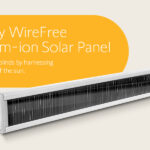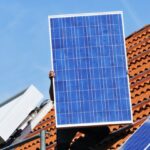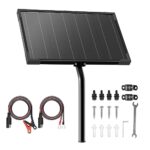What Size Solar Panel to Charge 12V 7Ah Battery: Optimal Energy Solutions
Discover the perfect solar panel size to efficiently charge your 12V 7Ah battery. Maximize energy output and ensure optimal performance in any situation! is sufficient under ideal sunlight conditions. The panel should provide enough energy to fully charge the battery in a day.
Selecting the correct size solar panel to charge a 12V 7Ah battery is crucial for efficiency and longevity. A 10-watt solar panel harnesses solar energy to replenish a 12V 7Ah battery effectively, ensuring a sustainable power solution. Typically, a fully discharged 12V 7Ah battery needs about 0.
Tangible Solar News
84 kWh to recharge fully, which a 10-watt panel can deliver in optimal conditions for a day. Making sure your solar panel receives ample sunlight is critical for a constant and reliable charging process. This clean, renewable energy charging method is becoming increasingly popular for maintaining small batteries used in home security systems, emergency lighting, or small hobby electronics, contributing to an eco-friendly lifestyle while providing energy independence.
Credit: www.quora.com
The Basics Of Solar Charging
Embracing solar energy offers a greener future. But understanding the basics is key. Solar panels convert sunlight into electricity. That electricity needs storage, commonly in batteries. The right solar panel ensures a full battery charge and is ready for use.
Solar Panels And Battery Compatibility
Choosing the correct solar panel for a battery is crucial. The solar panel must match the battery’s voltage and provide adequate current to charge efficiently. For instance, a 12V solar panel is ideal for charging a 12V battery. The panel’s wattage determines how quickly it can charge the battery. A higher-wattage panel will charge faster, given sufficient sunlight.
Consider factors like sunlight hours and the panel’s location. These affect the charging time and efficiency. A charge controller between the panel and the battery can prevent overcharging, extending the battery’s life.
Understanding 12v/7ah Batteries
A 12V 7Ah battery stores 7 ampere-hours of energy. It delivers 7 amps for one hour or 1 amp for 7 hours. Ideal for small setups, it’s common in emergency lights and small backup systems.
To fully charge a 12V 7Ah battery, you’ll need a solar panel that can produce at least 7Ah of power. Here’s a simple calculation:
| Battery Capacity (Ah) | Ideal Solar Panel Output (Watts) |
|---|---|
| 7Ah | 15-20 Watts |
It assumes 5 hours of suitable sunlight.
- Check the charging voltage of the solar panel. It should be close to the battery’s voltage.
- Remember the charging current should not exceed the battery’s maximum charge current.
- Use a charge controller to protect the battery from overcharging.
With these guidelines, selecting the right solar panel size for a 12V 7Ah battery is simple. A suitable panel will offer efficient charging and maintain battery health and longevity.
Determining Solar Panel Size
Determining the right size solar panel to charge a 12V 7Ah battery requires understanding your battery’s energy needs and the efficiency of the solar panel. This ensures the solar panel provides enough power to charge the battery under various conditions without being excessively large or expensive.
Calculating Energy Needs
Before choosing a solar panel, calculate the energy your battery needs. Here’s how:
- Find the battery capacity, which is energy stored in the battery, measured in Watts-hours (Wh).
- To calculate this, multiply the voltage (V) by the ampere-hours (Ah).
This means you need at least 84 Wh of energy to fully charge your battery from zero.
Assessing Solar Panel Efficiency
The efficiency of the solar panel is essential. It determines how much sunlight turns into usable electricity.
- Check the solar panel’s watt rating. This is how much power it generates in an hour under ideal conditions.
- Consider environmental factors like location or weather that affect panel performance.
A panel’s efficiency might range from 15% to 20%. This means a 100W panel could realistically offer between 75W and 80W in typical conditions.
Finding the right balance between battery needs and solar panel output is critical. Aim for a solar panel that exceeds the battery capacity by a margin to account for inefficiencies and daylight variability.
Solar Panel Types For Battery Charging
Choosing the right solar panel to charge your 12V 7Ah battery is crucial. Solar panels come in various shapes and sizes. Each type has its benefits. The type affects how efficiently you can charge your battery. Let’s explore the options.
Monocrystalline Vs. Polycrystalline
Monocrystalline solar panels boast a sleek look and high efficiency. They perform better in low-light conditions. Their cells are cut from a single crystal of silicon. This makes them more effective at converting sunlight into electricity. Polycrystalline panels, on the other hand, are made from multiple silicon crystals. They are cost-effective but slightly less efficient. Both types can charge a 12V battery, but monocrystalline panels do it faster.
Portable Vs. Fixed Solar Panels
Charging your battery can happen on-the-go or at a fixed location. Portable solar panels are light. They are simple to move. This makes them perfect for trips and outdoor activities. On the contrary, fixed solar panels are installed in one spot. They are usually larger. A fixed setup with proper angling to the sun maximizes charge time. Choose according to your need for mobility or stability.
Monocrystalline Solar Panels
- High efficiency
- Better low-light performance
- Great for faster charging
Polycrystalline Solar Panels
- More affordable
- Less waste during production
- Good for budget-conscious users
Portable Solar Panels
- Lightweight and mobile
- Convenient for travel
- Suitable for temporary setups
Fixed Solar Panels
- Sturdy and lasting
- Need professional installation
- Ideal for permanent charging stations
Selecting the right panel type ensures your battery charges effectively, supporting your power needs wherever you may be.

Credit: www.amazon.com
Installation And Configuration
Setting up your solar panel system correctly is key to efficiently charging a 12V/7Ah battery. Correct installation ensures maximum power absorption, while proper configuration manages the charging process to prolong battery life. With the right guidance, you can optimize your solar setup for the best performance.
Optimizing Panel Placement
Solar panel placement greatly impacts efficiency. Follow these steps to optimize placement:
- Orientation: Face panels are true south in the Northern Hemisphere.
- Angle: Tilt panels according to your latitude.
- Shadows: Keep away from trees or buildings that cast shadows.
Use a solar pathfinder or app to find the sunniest spot. Secure panels firmly to withstand winds and weather.
Charge Controllers And Their Role
A charge controller is essential for safe charging. It prevents overcharging and deep discharge. Consider these points:
- Type: Choose PWM or MPPT based on budget and efficiency needs.
- Compatibility: Ensure it matches your panel’s voltage and battery type.
- Settings: Configure the correct charge settings for your 12V/7Ah battery.
Install the charge controller between the solar panel and the battery for effective energy management.
Maintenance And Performance Monitoring
Maintenance and performance monitoring are crucial for the longevity and efficiency of your solar panel system. To ensure that your 12V 7Ah battery charges effectively, both the solar panels and the battery require consistent care. Understanding how to maintain and monitor this system will maximize its performance and lifespan, giving you the best return on your investment.
Regular Maintenance For Solar Panels
Keeping solar panels clean and obstruction-free is key to their efficiency. Dust, debris, or snow can block sunlight and reduce their output. Here are the main points to include in a regular solar panel maintenance routine:
- Clean the surface of the panels periodically to remove any dirt or grime.
- Inspect for any signs of damage or wear, such as cracks or discoloration.
- Trim any overhanging branches that might shade the panels.
- Ensure the mounting and support structures are secure.
A well-maintained solar panel array maintains its efficiency, which is essential for properly charging your battery.
Tracking Battery Health And Charge Levels
Monitoring your 12V/7Ah battery is just as important as maintaining your solar panels. Here are steps to track the health and charge levels of your battery:
- Use a voltmeter or a battery monitoring system to check voltage levels.
- Check the battery’s state of charge regularly to avoid overcharging or deep discharge.
- Maintain proper electrolyte levels if using a lead-acid battery.
- Inspect for any signs of corrosion on the terminals and clean them as necessary.
By actively monitoring the health and charge levels, you ensure the battery stores the solar energy reliably, ready for use when needed.

Credit: gembattery.en.made-in-china.com
Frequently Asked Questions Of What Size Solar Panel To Charge 12v 7ah Battery
How Many Watts To Charge A 12V 7Ah Battery?
The solar panel needed to charge a 12V 7Ah battery should ideally provide about 15 watts. This ensures that the battery charges efficiently under full sun without overcharging.
What Size Solar Panel Is Needed For 12V Batteries?
For a 12V 7Ah battery, a solar panel size between 10-15 watts is recommended. This range is sufficient for maintaining a full charge with good sunlight exposure while also accounting for energy loss.
Can a 10w solar panel charge a 12v battery?
Yes, a 10W solar panel can charge a 12V 7Ah battery. However, charging will be slower compared to a higher-wattage panel, and a continuous power supply might be required for a full charge.
Duration To Fully Charge 12v 7ah With Solar?
With a 15W solar panel, it typically takes about 5-8 hours to fully charge a 12V 7Ah battery, considering optimal sunlight conditions and a direct connection to the panel.
Conclusion
Selecting the right solar panel for your 12V/7Ah battery doesn’t have to be complex. Remember, match the battery’s watt-hour rating with the solar panel’s output for optimal charging times. Prioritize quality and efficiency to ensure your setup meets your energy needs.
Happy charging with your eco-friendly power solution!




